March 16, 2017
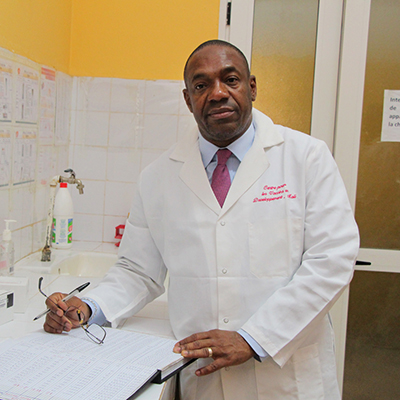
Dr. Samba Sow Was Crucial to Containing the Epidemic in the Country
Samba Sow, MD, MSc, Director General of the Center for Vaccine Development in Mali (CVD-MALI), and Adjunct Professor of Medicine at the University of Maryland School of Medicine, has been decorated as a Knight of the Legion of Honor from the French government. Dr. Sow, a native of Mali, was formally inducted on Bastille Day (July 14) by Évelyne Decorps, the Ambassador of France in Mali. This is the highest honor bestowed by the French government. He received the award for his crucial role in Mali’s response to the recent Ebola epidemic. As a result of his leadership, the country successfully tracked and monitored all potential cases to minimize a potential outbreak. CVD-Mali is jointly maintained by the Ministry of Health of Mali and the UM SOM CVD.
“Dr. Sow richly deserves this honor,” said CVD director Kathleen Neuzil, MD, MPH, FIDSA. “This work required enormous personal courage, technical expertise, tireless dedication, and strong leadership.”
Dr. Sow began his close collaboration with the Center for Vaccine Development (CVD) in 2001. The CVD is part of the UM SOM Institute for Global Health (IGH), which focuses on vaccine development and malaria research. This collaboration has led to the introduction of five lifesaving vaccines for children and adults in Mali and elsewhere in Africa. In the process, a team of highly trained Malian public health physicians was formed at CVD-Mali; this team was uniquely capable of responding to the Ebola epidemic under Dr. Sow’s leadership.
When the Ebola epidemic struck in West Africa in 2014, Dr. Sow and his team were prepared. As the epidemic spread, he responded. When most health workers fled the areas where the disease seemed to appear, he instead went to those places. He played a key role in setting up the Malian Ebola surveillance and containment network (for case detection and follow-up of contacts), emergency hospital unit, and border screening system. Collaborating closely with the Malian government, as well as civilian leaders, religious figures and others, Dr. Sow and his team worked nearly non-stop for months. Their efforts were rewarded: Mali was one of a very few West African countries to contain the epidemic. In recognition of his strong expertise, he has been appointed special advisor to Malian President Ibrahim Boubacar Keïta.
The Ebola outbreak, which occurred primarily in West Africa from 2013 to 2016, infected more than 28,000 people and killed more than 11,000. More than 10,000 were infected in Liberia, and nearly 5,000 died there. By contrast, eight people in Mali were infected, and six died.
Dr. Sow has other significant accomplishments as well: He helped lead clinical trials that resulted in the introduction of a vaccine that has played a major role in reducing Meningitis A in areas of Africa where the deadly disease was once common. More than 220 million people have received this vaccine in 26 countries. In Mali, he has also been a key actor in implementing Gardasil, a vaccine against cervical cancer, as well as vaccines against meningitis, pneumonia, and diarrheal diseases.
Dr. Sow received his MD degree from the Ecole Nationale de Medecine et Pharmacie du Mali, and his MSc degree from the London School of Hygiene and Tropical Medicine. Throughout his career, he has conducted research on vaccines, infectious diseases, and public health in Mali and Africa, and has been crucial in the country’s fight against leprosy. He has authored or co-authored more than 90 scientific articles and chapters and serves on high impact international committees overseeing the use of vaccines in developing countries.
“Dr. Sow has devoted his career to saving lives, especially the lives of those who are most in need of help. Ebola has been a major public health threat in Africa and elsewhere. His work has significantly decreased this threat,” said University of Maryland School of Medicine Dean E. Albert Reece, MD, PhD, MBA, who is also the vice president for Medical Affairs, University of Maryland, and the John Z. and Akiko K. Bowers Distinguished Professor. “His tireless and heroic work has succeeded in doing just that, many times over. I am very happy for him – he fully deserves this impressive honor.”
About the University of Maryland School of Medicine
Celebrating its 210th Anniversary, the University of Maryland School of Medicine was chartered in 1807 and is the first public medical school in the United States and continues today as an innovative leader in accelerating innovation and discovery in medicine. The School of Medicine is the founding school of the University of Maryland and is an integral part of the 11-campus University System of Maryland. Located on the University of Maryland’s Baltimore campus, the School of Medicine works closely with the University of Maryland Medical Center and Medical System to provide a research-intensive, academic and clinically based education. With 43 academic departments, centers and institutes and a faculty of more than 3,000 physicians and research scientists plus more than $400 million in extramural funding, the School is regarded as one of the leading biomedical research institutions in the U.S. with top-tier faculty and programs in cancer, brain science, surgery and transplantation, trauma and emergency medicine, vaccine development and human genomics, among other centers of excellence. The School is not only concerned with the health of the citizens of Maryland and the nation, but also has a global presence, with research and treatment facilities in more than 35 countries around the world. Visit medschool.umaryland.edu/.
Learn More
Contact
Office of Public Affairs
655 West Baltimore Street
Bressler Research Building 14-002
Baltimore, Maryland 21201-1559
Contact Media Relations
(410) 706-5260
Related stories
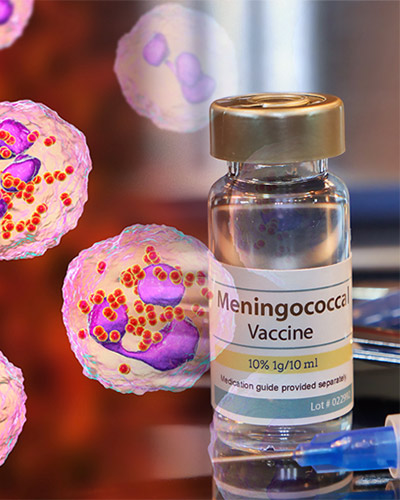
Thursday, March 24, 2022
UM School of Medicine Leads Research to Assess Meningococcal Vaccine for Infants and Young Children in Africa
Researchers at the University of Maryland School of Medicine (UMSOM)’s Center for Vaccine Development & Global Health (CVD) are leading a study to evaluate the use of a pentavalent – or five in one – meningococcal conjugate vaccine (NmCV-5) among infants and young children in the meningitis belt of sub-Saharan Africa. This is the final and pivotal study for World Health Organization (WHO) prequalification of this vaccine, which is the last stage to make the vaccine available for low- and middle-income countries.
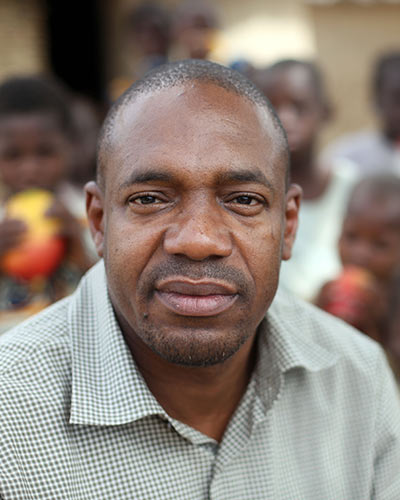
Wednesday, May 03, 2017
University of Maryland School of Medicine Adjunct Professor Named Minister of Health for Mali
Samba Sow, MD, MSc, Director General of the Center for Vaccine Development in Mali (CVD-Mali), and Adjunct Professor of Medicine at the University of Maryland School of Medicine (UM SOM), has been named the Minister of Health for Mali.
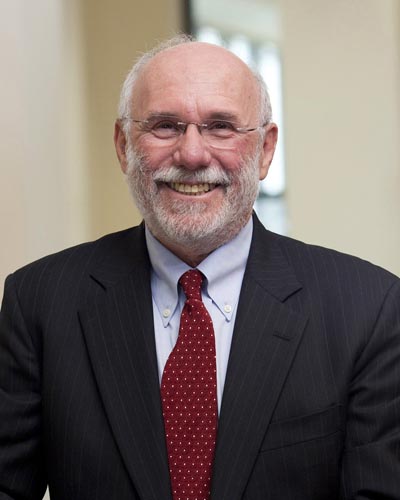
Friday, December 23, 2016
Trial Results Confirm Ebola Vaccine Provides High Protection Against Disease
An experimental Ebola vaccine was highly protective against the deadly virus in a major trial in Guinea, according to a new study that included researchers from the University of Maryland School of Medicine (UM SOM).
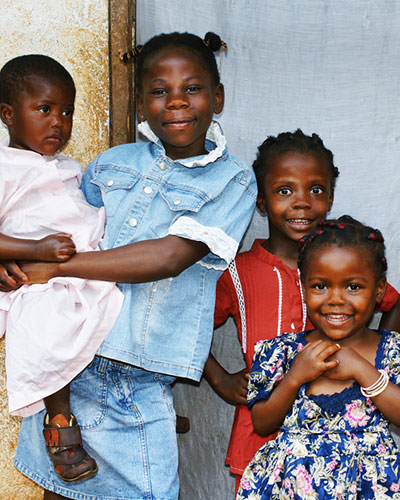
Wednesday, June 29, 2016
UM SOM Researchers Awarded Grant to Use Innovative Alternative to Autopsies to Better Understand Child Mortality
Kathleen Neuzil, MD, MPH, director of the Center for Vaccine Development (CVD) at the University of Maryland School of Medicine (UM SOM), and UM SOM Dean E. Albert Reece, MD, PhD, MBA, announced today that CVD has been awarded a large grant from the Bill & Melinda Gates Foundation for research that will help determine why so many children under five are dying in the world’s poorest countries. The grant will fund use of an innovative alternative to traditional autopsy known as minimally invasive tissue sampling. The technique, which involves the collection of tissue samples with fine needles, allows researchers to quickly identify the cause of death, and help illuminate ways to save lives and improve the health of children in these vulnerable areas.
